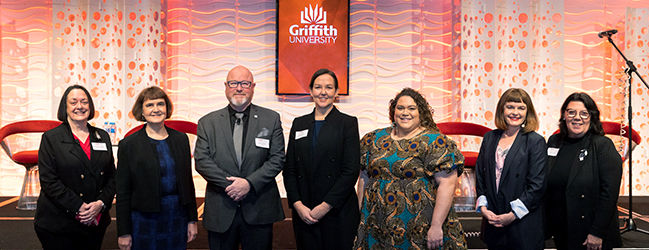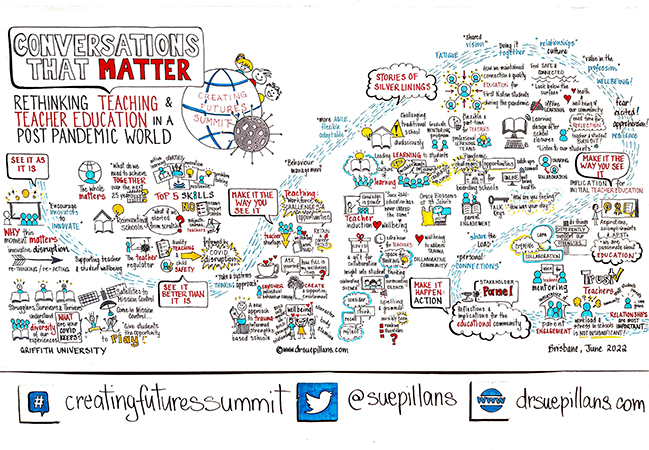Creating Futures Summit: Conversations that Matter
Professor Donna Pendergast
Dean, School of Education and Professional Studies, Griffith University
Chair,Queensland Council of Deans of Education

(L to R) Prof. Donna Pendergast, Prof. Carolyn Evans, Malcolm Elliott, Deanne Fishburn, Waveney Yasso, Sarah Kanowski and Dr Mia O’Brien (Image: Griffith University)
In June, education professionals gathered for the seventh annual Creating Futures Summit on the topic: Rethinking teaching and teacher education in a post-pandemic world. The Queensland College of Teachers and the Queensland Council of Deans of Education were key collaborators and partners alongside the host Griffith University’s School of Education and Professional Studies with co-convenors Professor Donna Pendergast and Dr Mia O’Brien. The Summit events are now a regular feature in our calendars, with the 2022 Summit being the seventh to engage in conversations that matter to the teaching profession.
The 2022 hybrid event drew more than 100 organisations, 240 in-person and 280 on-line delegates from all around Australia and from 11 countries, who collectively experienced 17 challenging 5-minute provocations from amazing education leaders nationally and around the globe – including QCT Director Deanne Fishburn, and 27 speakers in panel discussions. The event was fast moving with delegates engaged in a journey of generating ideas and voting to create a shared, futures-oriented series of outcomes to address where innovative disruption has impacted the teaching profession and what we can optimistically, intentionally, and enthusiastically harness and amplify for the future.
Why the Summit matters
March 11, 2020 is the day the world as we know it changed with the World Health Organization [WHO] (2020) officially declaring the viral infection emanating from the novel coronavirus COVID-19 a global pandemic. The pandemic has had wide-ranging impact on student learning and wellbeing, which in turn will have a long-lasting effect on individuals and on economies, and affecting the most vulnerable learners the hardest. The reach is now being quantified in ways that we can better understand, including this data insight from McKinsey & Company (2022):
- 91% schools and 1.5+ billion students impacted
- 59 weeks of partial or full school closure
- 1.8 trillion years of in-class learning
- Average learning delay of 8.2 months
- Home learning not always effective
- School refusal, absenteeism, depression
There is no precedent for global learning delays at this scale. UNICEF has declared that “[T]he numbers are unprecedented, the implications enormous” (Miks & McIllwaine, 2020). A legacy that remains is the ongoing need for mental health programs designed to address burgeoning student and staff wellbeing and mental health issues (Pendergast & Dobson, 2021) now commonly referred to as the shadow pandemic (McGorrie, 2021). As we move from the liminal space of the pandemic crisis to the new normal, the opportunity for transformation has never been greater. The experience of innovative disruption and the potential to shape the future is here, now.
The Summit set out to consider:
- What have we learned as educators, students, and members of the community?
- What do we want to stop doing, keep doing, and start doing?
What did Summit delegates tell us – a sneak peak
Summit delegates generated responses to a series of prompts following provocations and conversations. These were distilled into themes and delegates then voted on the statement that most resonated with their experience. This is what they told us, in the order of highest frequency, for some of the questions:
What was challenging?
- Supporting teacher and student wellbeing
- Change in teacher mindset and skillset
- Inequity within society increasingly obvious
- ITE students felt unprepared
- Teacher care and concern for disadvantaged disconnected students
How has the pandemic changed what you do?
- More agile, flexible and adaptable
- Increased technology usage and availability
- Future thinking
- Appreciation of the fundamental elements
- Different ways of working with families
What are the innovations you would like to keep?
- All of the below
- Flexibility in work structures
- Flexibility on learning design
- Flexibility to innovate
- Flexibility to connect beyond the classroom
What legacy can we create for teachers and teacher education?
- Value the profession
- Innovative mindset
- Lean on each other
- Work life balance
- The unexpected can be a gift
Want to know more?
The program and all presentations of the Summit are available at the link provided. Keep an eye on the website for updates:
In the meantime, enjoy the Summit Illustration by the amazing Dr Sue Pillans, who captured the themes delegates engaged in during the day.

References
McGorry, P. D. (2021). The reality of mental health care for young people, and the urgent need for solutions. Medical Journal of Australia.
McKinsey & Company. (2022). How COVID-19 caused a global learning crisis. McKinsey & Company.
Miks, J. & McIllwaine, J. (2020). Keeping the world’s children learning through COVID-19. UNICEF
Pendergast, D. & Dobson, S. (2021). Fears loom for teens undergoing vital brain development during COVID—telling stories might help. The Conversation.
World Health Organization. (2020). Listings of WHO’s response to COVID-19. https://www.who.int/news/item/29-06-2020covidtimeline